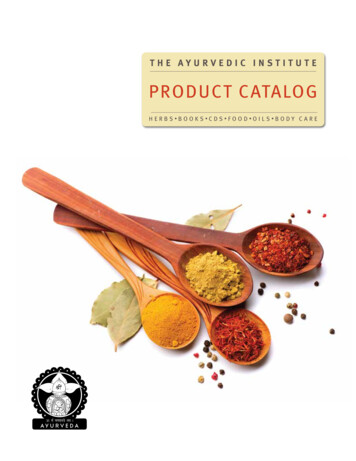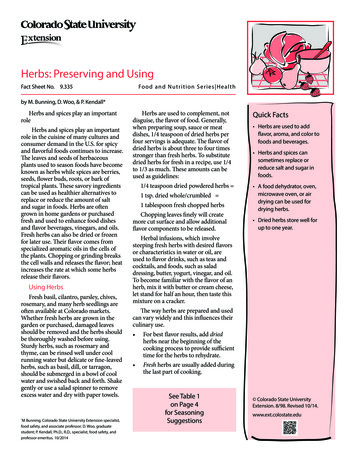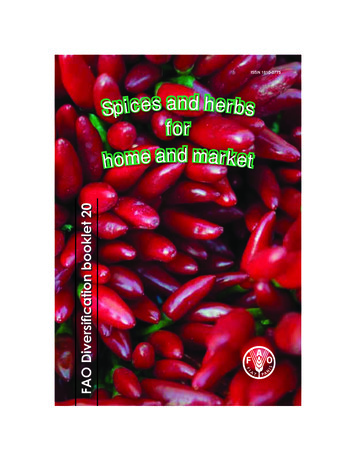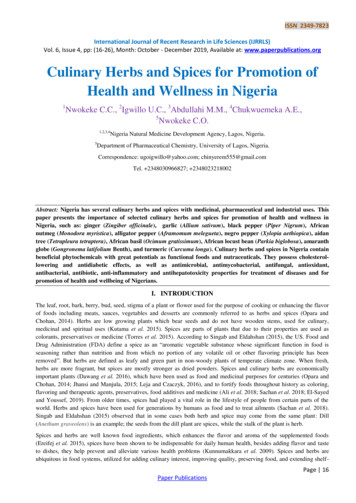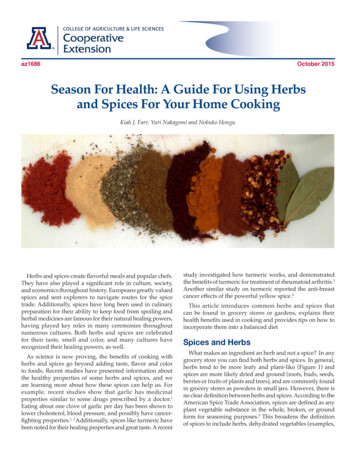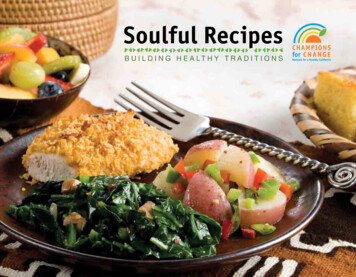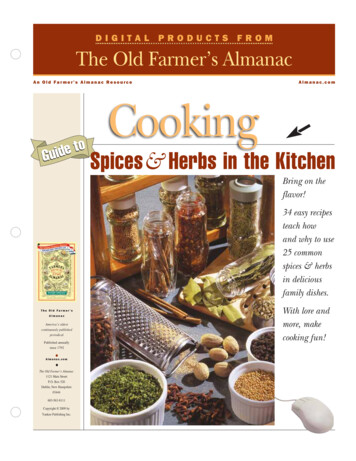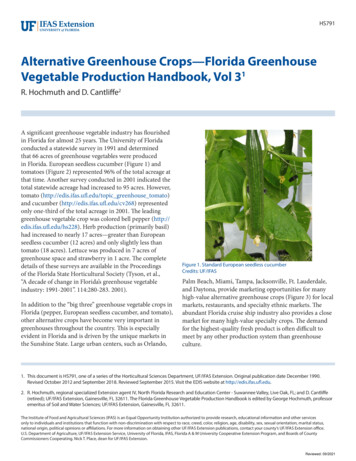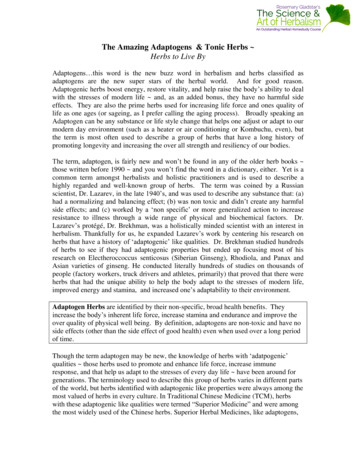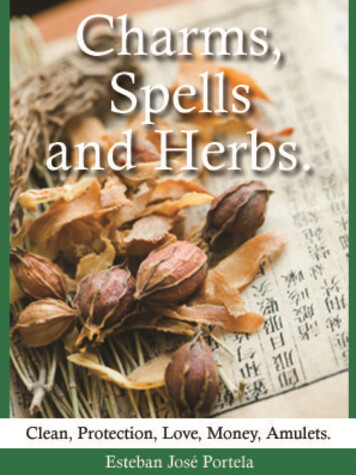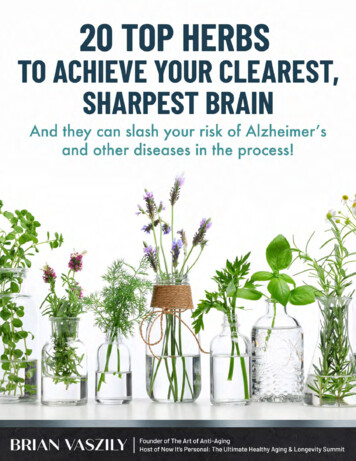
Transcription
20 Top Herbs to Achieve YourClearest, Sharpest BrainAnd they can slash your risk of Alzheimer’s andother diseases in the process!Copyright 2022 The Art of Anti-Aging, LLC, All Rights Reserved.www.theartofantiaging.comNo part of this publication may be reproduced, stored in a retrieval system or transmitted in any formor by any means, electronic, mechanical, photocopying, recording or otherwise without the writtenpermission of the publisher.Publisher: The Art of Anti-Aging, LLCDisclaimer: For educational use only. The entire contents of the book are based upon research conductedby the author, unless noted otherwise. This book and the information contained within are not intendedto diagnose or prescribe for medical or psychological conditions nor to claim to prevent, treat, mitigate orcure such conditions. The author and publisher are not recommending specific products as treatment ofdisease and do not have any interest in the sale of the substances described in this book. This informationshould not replace the opinions of a medical professional. These statements have not been evaluated bythe Food and Drug Administration.
21 World-Renowned Experts Reveal the TOP Secrets THEY Use to Age WellIn NOW IT’S PERSONAL, The Ultimate Healthy Aging & Longevity Summit, you are about to discoverthe proven most effective natural secrets of all to look and feel your best, avoid and overcome disease,and live long and well. In fact, as you’ll discover, the steps are so powerful that today’s top expertspersonally make certain to take these steps themselves!Each of the 21 interviews truly holds the potential tochange your life, so you don’t want to miss a moment ofthis once-in-a-lifetime online event!In this brand-new special report, meanwhile, you’re about to discover ways to stop, reverse, and healmany of the aging effects on the brain through specific herbal compounds that have been used forcenturies around the world, many specifically for mental health and cognitive benefits.(Please DO share this useful recipe guide with loved ones!)“What steps should you take that will make THE mostpowerful difference in how long and how well youlive? Steps proven so effective that today’s top longevityand lifestyle physicians and researchers personally takethose steps themselves? Those are the mission-criticalquestions you are about to get answers to in NOW, IT’SPERSONAL: The Ultimate Healthy Aging and LongevitySummit. My good friend and natural health veteran,Brian Vaszily, is an outstanding host, what you’ll learn isessential as it gets, so be sure to listen to this importantonline event!Dr. Joel FuhrmanWorld-Renowned M.D., 7-Time NY Times Bestselling Author
HOW DO YOU REALLY FEELABOUT THE FOLLOWING?Hello, Brian Vaszily here, founder of The Art of Anti-Aging, host of NOW, IT’S PERSONAL: The UltimateHealthy Aging and Longevity Summit, and a health researcher and bestselling author who others havecalled a “leading voice” in the natural health world for over 20 years.And before diving into this special report, pleasesee how you feel about the following Here at The Art of Anti-Aging, the “anti” meanswe’re against all the destructive lies aboutgetting older out there that equate hitting your30s, 40s, 50s, 60s and beyond, with becomingincreasingly undesirable, incapable, doomed tosuffering and disease, and “over the hill.”We’re against all the toxic “solutions” and toxicthinking so often pushed on people by the BigCosmetic, Big Food, and Big Pharmaceuticalindustries, who so often play upon thosedestructive aging lies and manipulate peoplethrough fear.Instead, we are certain that when you take theright steps, your “middle years” and “goldenyears” will truly be your best years.And we are 100% committed to providing youwith the proven most effective health andwellness steps to achieve that to look yourbest, feel amazing, avoid and overcome disease,and live a long life doing it.If our mission sounds worthwhile to you, welcometo our positive and supportive community
CLARITY ON WHAT WILL MAKE THE BIGGESTIMPACT ON YOUR HEALTH AND LIFEThere’s an overwhelming amount of health info out there in online events, blogs, articles, and more.And it all presents two very big problems that frustrate and even mislead many people.One, so much of it is not evidence-based from sources you can trust.Two, it causes serious confusion, because people are unclear on what steps to invest their precioustime and energy in that will actually make the fastest and most powerful difference in their health andlife.That’s why NOW, IT’S PERSONAL: The Ultimate Healthy Aging and Longevity Summit truly may be THEmost life-changing and possibly even life-saving event you ever experience.You see, in NOW, IT’S PERSONAL, I’m getting straight to the heart of the matter for you. That’s becauseI’m gathering 21 of today’s most renowned healthy aging and longevity doctors and researchers, eachfrom different areas of expertise. And I’m challenging them each to reveal their answers to this oneMISSION-CRITICAL question for you:“From your unique area of expertise, what are the 3 MOST IMPORTANT steps of all that youpersonally take – including those that people may not be familiar with – to look and feel your best,avoid and even overcome disease, and live long and well doing it?”Yes, the most powerful learning we can engage in is understanding what steps are so effective that theexperts make certain to personally take those steps themselves. And in NOW, IT’S PERSONAL, you’regetting TOTAL CLARITY on only those most effective steps that will make the biggest difference in yourhealth and life, too.True, you don’t yet know from which of the 21 top doctors and researchers the insights will come thatlead to the biggest breakthroughs for you in particular However, considering these world-renowned experts are each revealing only their proven mostpowerful secrets, you can be certain those life-changing insights WILL come.That is why you truly do not want to miss a moment of this unique summit. If you miss even asingle expert, after all, you may well miss that one crucial gem that makes ALL the difference for you.Therefore Head here now to sign up for the FREE online NOW, IT’S PERSONAL: The Ultimate Healthy Aging andLongevity Summit if you aren’t signed up already and Head here to get the COMPLETE recordingsand written transcripts of the entire summitif you don’t feel you’ll be able to hear all7 days of this essential event when it airslive, and to experience it all on your ownschedule when and where YOU choose.
TABLE OF CONTENTSIntroduction. 1Modern Herbal Medicine. 2Herbs for Brain HealthAyurveda (Indian) HerbsBacopa.Guduchi.Shankhpushpi.Holy Basil.3455Herbs of the AmericasLion’s Mane. 6Maca. 7Sage Extract. 8European HerbRosemary. 9Saffron. 10Spearmint. 10Pine Bark Extract. 11Chinese Traditional MedicineGinseng.Astragalus Root.Ginkgo Biloba.Gotu Kola.Lemon Balm.1213131414Middle Eastern HerbsBlack Cumin Seed. 16Turmeric. 17Promising African Herbs. 18Looking Forward. 19About NOW IT’S PERSONAL: The Ultimate Healthy Aging & Longevity Summit. 20References. 22
INTRODUCTIONAs we humans age, so do our minds. Certain areas of the brain may shrink, blood flowdecreases, and inflammation may set in. This can affect thinking and processing, and in moreserious cases, lead to problems with long term memory and daily functioning.Fortunately, we can stop, reverse, and heal many of these effects. One of the most surprisingand effective ways to do this is through the use of herbs. These compounds have been usedfor centuries around the world, many specifically for mental health and cognitive benefits.Modern medications to enhance focus and treat mental conditions such as dementiaand Alzheimer’s disease often come with high cost and side effects. Western medicine isrecognizing the limits of these drugs, and many scientists are returning to age-old nootropics.These medicinal treatments and supplements specifically fight aging of the brain, increasecognition, and protect the brain from processes that lead to neurological diseases.20 Top Herbs to Achieve Your Clearest, Sharpest Brain1
MODERN HERBAL MEDICINEThe World Health Organization defines traditional medicine as, “. the sum total of the knowledge, skill,and practices based on the theories, beliefs, and experiences indigenous to different cultures used inthe maintenance of health as well as in the prevention, diagnosis, improvement or treatment of physicaland mental illness.” Herbal treatments are one of the most commonly used traditional medicines.Herbal remedies and enhancers may include (World Health Organization, 2021): Herbs Herbal materials Herbal preparations Finished herbal products Combinations of herbs and other plant materialsThese herbal treatments may be used as alternatives, supplements to, or monitored as medicines withina given region or culture.In the U.S. it is often noted that most natural treatments are not approved by the Food and DrugAdministration. This typically means that the FDA has not investigated certain products or supplements.However, academic researchers around the world, including in Western cultures, are verifying themedicinal benefits of natural plant treatments. In some cases, these are shown to be as effective, ormore so, than pharmaceutical medications. Such herbs may offer many of the same benefits, but withoutthe same concerning side effects.Specifically, studies in the past few decades have verified that certain herbs may help improve focus,learning, performance, and memory. They may also help prevent and manage conditions like ADHD andAlzheimer’s disease. Compounds in herbal medicines often act as antioxidants and anti-inflammatories,and provide protection for the brain. Some may even reverse brain damage and diseases.20 Top Herbs to Achieve Your Clearest, Sharpest Brain2
HERBS FOR BRAIN HEALTHSo how can these herbs work for you, which are most beneficial, and how should you use them? Let’slook at 20 top herbs from around the world that can help protect your brain health, and maybe evenimprove upon it.Please note that in general, herbal treatments are considered safer, with fewer to no side effects, comparedto pharmaceuticals. However, some compounds can be just as powerful as prescription drugs, and theremay be certain concerning interactions, such as if you are taking any medications, or other situationswhere some herbs are not safe nor recommended. As with any supplemental change, make sure to reviewyour situation with a trusted medical practitioner to ensure safety and effectiveness of use.AYURVEDA (INDIAN) HERBSAyurveda is an ancient medicine system used in India, based on natural and holistic practices, and informsthe region’s healthcare today. It’s more than 5,000 years old, and traditionally combines the use of plantsand herbs, along with a healthy lifestyle. It may include elements of natural medicine along with yoga,meditation, massage, and other mind-body activities.In Ayurveda, all things in the universe, dead or alive, are connected. When all things in your life are inbalance, you enjoy good health. If things are askew, you develop disease and related symptoms.When things are out of balance, holistic practitioners focus on cleansing the system of negative elements.Herbs are one type of treatment used in this traditional medicine. Ayurveda methods are still practicedregularly in India. These herbs are commonly used in India today, as well as in other cultures, and areknown to benefit brain health, focus, and prevent disease.BACOPAThe Thinking Person’s HerbBacopa, sometimes called water hyssop, or Brahmi afterthe god Brahma, is a traditional Indian medicinal plant. It’shistorically used to bless newborns due to its renowned abilityto increase intellect. Today it’s known for treating memory,ADHD, and Alzheimer’s disease.Bacopa is often confused with gotu kola, also referred to asBrahmi. While the plants are similar, they work a bit differently.Bacopa is commonly used as a supplement to bring thebody’s functions into balance. One of the plant’s compounds,bacosides, is responsible for many of its positive effects.One academic study found that a daily bacopa supplement improved visual processing, learning, andmemory among healthy adults, compared with a placebo group. The researchers in the study believe thecompound may be helpful for learning in situations that require input from the external environment20 Top Herbs to Achieve Your Clearest, Sharpest Brain3
(Stough et al., 2001). This would make it a good candidate for treating attention deficit-hyperactivitydisorder (ADHD).Similarly, bacopa has been found to improve cognitive processing, working memory, and attention (PethNui et al., 2012).The use of bacopa for Alzheimer’s disease is in early stages, but studies have shown that it can protectthe prefrontal cortex and hippocampus, and may prevent damage that occurs in the process of thisdisease (Chaudhari, 2017).If you’re looking to help a child or teen struggling with memory, attention, or hyperactivity, bacopa maybe your new go-to. Numerous studies have shown it helps with visual and verbal memory and cognitivefunction, with no side effects in most participants (Kean et al., 2016).HOW TO USEBacopa is commonly taken as a capsule or in powder form. Typical doses from supplementsare 100 to 500 mg per day. It’s also available as drops or shakes for kids and you’ll find it as aningredient in some teas.GUDUCHIThe Heavenly ElixirTinospora cordifolia, known as Guduchi, is a well-knownherbal treatment in India, dating back to ancient times. It’sa climber plant, common in many residential areas. It ismentioned in ancient myths, including a famous story whereLord Indra planted guduchi following a prayer for help. It’sknown by many other names, including the “heavenly elixir,”and it’s commonly used to treat diabetes, to manage stress,for respiratory conditions, and as an anti-aging herb.Some scientists believe this natural treatment may provide protection for the brain againstneurodegenerative diseases like Alzhiemer’s. In one study guduchi extract helped prevent damage to thebrain caused by inflammation and membrane damage (Sharma & Kaur, 2018). Academic research is inearly stages.HOW TO USEGudichi is most often used in powder made from the stem, mixed in water and honey, or boileddown. Many recommendations include taking around two grams once daily. You’ll also find itas an ingredient in certain teas.20 Top Herbs to Achieve Your Clearest, Sharpest Brain4
SHANKHPUSHPIThe Brain TonicShankhpushpi is an ancient Indian nootropic, often used forthe nervous system in Ayurveda medicine. This flowering herbmay help with memory, depression, anxiety, and other brainrelated struggles. There are four varieties, including Canscoradecussata schult, Clitoria ternatea, Convolvulus pluricaulis,and Evolvulus alsinoides.Modern studies have begun to test these potential benefits. Inone early study, Evolvulus alsinoides in particular was found tobenefit memory recall. This may be due to compounds presentincluding steroids, coumarins and flavonoids (Sethiya, 2019).Further studies are needed to confirm this early research.HOW TO USEShankhpushpi can be consumed as a syrup, powder, or juice. The powder form is generallytaken as ½ teaspoon, once to twice per day.HOLY BASILElixir Of LifeHoly basil, or tulsi, is another all-around healthy herb used formany centuries in India. It’s also called the elixir of life. Thisincredible plant can help with inflammation, bacteria, stress,concentration, toxins, and much more. It works to both calmnerves and maintain energy. As its name suggests, it’s oftenused in spiritual practices as well.Holy basil is also used to manage blood glucose, blood pressure,and to help with psychological stress. All of its positive effectshelp with memory, mood, and cognitive functions. It’s oftenrecommended as a natural treatment for attention difficulties(Cohen, 2014).HOW TO USEHoly basil is often taken as a tea, and experts recommend around three to five cups per day.It’s also available as an extract and essential oil.20 Top Herbs to Achieve Your Clearest, Sharpest Brain5
HERBS OF THE AMERICASMany natural medicines were used by indigenous and other early cultures throughout the Americasfor centuries. There are not many written records from early times, and what is available may havesignificant European influences, calling some history into question.In North America, some oral histories of native cultures suggest that herbs were used to treat healthconditions such as stomach conditions, colds, and fever. As with traditional Indian medicine, remedieswere combined with other health and spiritual life practices.In Latin America, a similar approach of balance was likely used, and herbs were assigned for certain uses.Hallucinogens were also utilized for spiritual and medicinal purposes.Today, natural herbal treatments are considered alternative or supplemental approaches, especially inthe United States. However, due to the many benefits of medicinal herbs, which typically have fewerside effects compared to synthetic drugs, many academic researchers have renewed interest in thesetreatments. Many of the herbs currently being studied by academics offer specific benefits for brainhealth.The following herbs are commonly known in the Americas, as well as other parts of the world, and arespecifically used for purposes of cognition, focus, memory, and diseases that affect brain function.LION’S MANEThe Medicinal MushroomLion’s mane is also referred to as hericium erinaceus,yamabushitake, and the hedgehog mushroom. It grows inNorth America, Asia, and Europe. Chinese and Japanesemedical practitioners have traditionally used it for digestionrelated diseases, to treat ulcers, fight cancer, and forneurological health. Indigenous cultures in America may havealso used it to stop bleeding.Lion’s mane includes two important compounds, hericenonesand erinacines, which can cross the blood-brain barrier to reachbrain cells. It’s been shown to work against damage causedby beta-amyloid, a protein in the brain that scientists believemay be to blame for Alzheimer’s symptoms. Researchershope lion’s mane may prevent dementia and work against thedevelopment of the disease (Mori et al., 2011).In one study, lion’s mane was provided to a group of people aged 50 to 80, and compared to a groupgetting only a placebo. Those using the compound had significantly improved cognitive scores, whichdecreased again after they stopped taking the supplement (Mori et al., 2009).20 Top Herbs to Achieve Your Clearest, Sharpest Brain6
HOW TO USELion’s mane can be consumed as a tea, cooked, dried, or eaten raw. It’s often available insupplement form. Recommendations vary from 300 to 3,000 mg daily, divided into two tothree doses per day. Many people also enjoy preparing the lion’s mane in its original mushroomform, and find the taste similar to fish or crab.MACAFood of the BrainMaca, or maca root, is native to the very high altitudes of Peru. It has been used for thousands of yearsas a health food and for medicinal purposes. It’s traditionally believed to help with fertility, hormonalbalance, energy, and mental focus. Those in the Peruvian Andes would give maca to children to help withlearning.There are multiple colors of maca, including red, yellow, and black. Black maca seems particularlypromising, and early academic experiments confirm it may help with memory and learning. It may alsocorrect memory impairment caused by multiple conditions (Gonzales, 2012).Some scientists believe that consuming maca may help decrease cognitive decline, and other side effectsof aging. Early studies have shown it may increase cognition, coordination, and endurance (Guo et al.,2016).Black maca has been of particular interest for its hormonal benefits, and may be beneficial for thosein early and post menopausal stages. Early studies have also shown it may help with memory andconcentration caused by hormonal changes (Rubio et al., 2011).HOW TO USEMaca can be taken as a powder, liquid, capsule, or extract. Dose recommendations vary, butare generally around three grams per day.20 Top Herbs to Achieve Your Clearest, Sharpest Brain7
SAGE EXTRACTThe Savior HerbSage, or salvia, has a rich history around the world, often usedby the French, Chinese, Romans and others as an all-aroundmedicinal herb. It was commonly used by indigeneous culturesin the Americas as a physical and spiritual healer.It had many purposes throughout the world, varying fromtreating stomach conditions to pain to sore throats. Today it’sknown for helping with mental conditions such as depressionand Alzheimer’s disease. The origin of its latin name means to“be saved” (Filippone, 2021).Today scientists are very interested in sage for its mentalbenefits. This is based on early references by experts from the1500s. In 1587, a famous herbalist, John Gerard, wrote, “Itis singularly good for the head and brain and quickeneth thenerves and memory,” (Science News, 2003).Multiple studies have shown that sage has positive cognitive benefits for adults. It may counter betaamyloid, and works as an antioxidant, antidepressant, and anti-inflammatory. It fights against oxidativestress, which may cause or contribute to neurological disorders. Early studies suggest it may thereforehelp prevent or decrease effects of Alzheimer’s disease (Loprestri, 2017).HOW TO USESage can be consumedas a tea, in cream form,as an extract, or addedto food dishes. It’s alsoavailable as an essentialoil. Recommended dosesvary and may depend onthe form you’re taking itin. In tea form, aim forseveral cups per day. Ifyou’re using dry leaves,you might add ½ teaspoonto water, or add twoteaspoons of fresh leavesto a soup.20 Top Herbs to Achieve Your Clearest, Sharpest Brain8
EUROPEAN HERBSEuropean herbs have a rich history in Roman and Greek cultures. One of the most famous promoters ofmedicinal plants was Pedanius Dioscorides, a Greek physician dating back to around 50 A.D. He wroteextensively about hundreds of herbs and their proper uses and documented them into a famous textcalled the De Materia Medica.Over the centuries, herbal uses went in and out of vogue in European regions. Some medicinal branchescontinued to study plant medicine, while others veered into the use of heavy metals. Rulers of the timehad significant influence on the uses and attitudes towards various treatments, and historical records arealso greatly influenced by these biases (DiPasquale, 2005).Herbal medicine is highly popular in Europe today, and is monitored for safety similarly to pharmaceuticaldrugs. These herbs, focused on brain health, are common to ancient and modern Europe, while alsobeing used in other cultures around the world.ROSEMARYThe Herb of Friendship and MemoryWhile modern research has confirmed the mental benefitsof rosemary, these results wouldn’t be much of a surpriseto early Greeks and Romans. Rosemary is mentioned as anoffering used by King Ramesses III to the gods, and is oftenreferenced in Christian mythology. Ancient Greek studentswore rosemary to help them prepare for tests. It’s referred toas the herb of friendship and memory (Grivetti, 2021).Apparently, that’s for good reason. A modern study examined Rosemary’s effect on 20 adults. They weretested with math questions, and both their speed and accuracy improved as more rosemary oil wasdiffused into the room. This study also showed that the compound could enter the body through justbreathing the aroma, and that it also improved the mood of participants (Moss & Oliver, 2012).Multiple other studies have found similar benefits for focus, cognition, and memory. One project examinedthe use of blended essential oils, including rosemary, for 29 elderly people with dementia. Seventeen of theparticipants were diagnosed with Alzheimer’s disease. All participants showed significant improvementon multiple cognitive studies, with particular benefits for the Alzheimer’s patients (Jimbo et al., 2009).Rosemary grows along the Mediterranean Sea and in sub-Himalayan regions. It’s also traditionally usedfor headaches, migraines, depression, and insomnia. A review of numerous studies showed consistentbenefits for inflammation, anxiety, pain, and memory (Ghasemzadeh Rahbardar & Hosseinzadeh, 2020).HOW TO USERosemary can be ingested as an oil, tea, or used as a seasoning. It’s often used in potato orbean dishes.20 Top Herbs to Achieve Your Clearest, Sharpest Brain9
SAFFRONThe World’s Most Valuable SpiceSaffron is one of the most widely known and used herbs,known in multiple parts of the word for at least 3,000 years. Itwas most likely cultivated in Greece. The plant is very delicateand must be carefully harvested by hand. This leads to itsstatus as one of the most sought-after and highly valuableherbs for health.This powerful plant consists of crocin, picrocrocin andsafranal. It’s been used to treat multiple health conditionsand ailments, such as depression, cancer, eye problems, heartdisease, and more (Mousavi & Bathaie, 2011). It’s also beencommonly used as a dye and perfume, and is known for itsrich, bright color.In recent years, this important plant has been examined more closely as a possible natural treatmentfor dementia and other types of cognitive impairment. Studies do indicate that its use leads to mentalimprovement specifically in Alzheimer’s patients (Ayati, et al., 2020), and researchers recommend thebenefits be further investigated. It’s believed that saffron may work by fighting accumulations of betaamyloid (Akhondzadeh, et. al, 2010).HOW TO USEMost often, those who consume it soak the threads in hot water, and then mix it into anotherliquid or a dish. Up to 1.5 gram of saffron per day is considered to be safe for most people.Taking more than 5 mg may be toxic in some cases, such as for pregnant women.SPEARMINTThe Yummy HerbThis minty herb is traditionally used to help with digestiveissues, as an antioxidant, and to help women with hormonalimbalances. It’s native to Europe and Asia. It’s commonlyused as a tea or oil, and is a popular flavor for candies andtoothpastes.The antioxidant properties of spearmint may help improvelearning and memory, as shown in early testing (Farr et al.,2016).In one study, (Herrlinger et al., 2018), participants withmemory conditions relating to aging were given daily20 Top Herbs to Achieve Your Clearest, Sharpest Brain10
spearmint extract, and compared to a group getting a placebo. Those assigned the spearmint experiencedsignificant improvements, including the following: 15% improvement in working memory Increased energy Improved ability to falling asleep Better mood More alertness when
more so, than pharmaceutical medications. Such herbs may offer many of the same benefits, but without the same concerning side effects. Specifically, studies in the past few decades have verified that certain herbs may help improve focus, learning, performance, and memory. They may also help prevent and manage conditions like ADHD and
